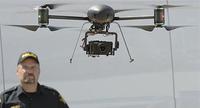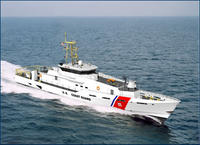-
Yuba City purchases tactical robot with DHS grant money
The Yuba City police department in California is spending a portion of its nearly $70,000 grant from DHS to purchase a remote controlled tactical robot; the “tactical entry robot” is designed to help police officers when they are confronting an individual barricaded inside a home; the robot is equipped with a wide-angle camera and can help provide officers with information on what is occurring inside; the robot can also help officials survey dangerous chemical spills or other hazardous situations where human exposure may prove fatal; the robot costs nearly $12,00, is roughly the size of an industrial lawn mower, and is able to climb stairs; Yuba City expects to receive the robot in the next six months
-
-
DHS requesting boost in cybersecurity funds
Government, industry, and academia have labeled the shortage of cyber specialists in the government as a national security problem; the United States is looking to hire 30,000 security experts to safeguard cyberspace as opposed to the 1,000 personnel currently staffed government wide; DHS has requested $936 million in funding for FY 2012 to grow the federal cybersecurity workforce and enhance network protections
-
-
As REAL ID looms, states revise driver's license laws

States must be in compliance by May with the regulations laid out in the 2005 REAL ID Act; the law, a recommendation of the 9/11 commission that investigated the 2001 terror attacks, creates a national security standard for state-issued identification cards to be used for purposes like boarding airplanes and entering federal buildings; REAL ID, originally intended as a counterterrorism tool, has had an unintended side effect that has won support of immigration enforcement advocates — it requires driver’s licenses issued to immigrants to expire at the same time as their stay in the United States, invalidating the licenses of immigrants who overstay their visas; states that allow illegal immigrants to obtain driver’s licenses are now revising their laws as a federal deadline for REAL ID approaches
-
-
No, a Boy Scout cannot build a backyard nuclear reactor
Dirty bombs are easy to build and only require strapping explosives to radioactive material; in counter-terrorism circles there is a myth that in 1995 a Boy Scout was able to assemble enough radioactive materials to build a nuclear reactor in his backyard in Michigan by gathering all of his materials from common household items; he dismantled lanterns to obtain Thorium, smoke detectors for Americium, and old clock dials for Radium; analysts say that it would take material from roughly two million smoke detectors to build a dirty bomb that would cause any damage
-
-
The past as prologue: The Galant affair
On Monday, General Benny Ganz replaced General Gabi Ashkenazi as the IDF chief of staff; in the four months leading to Ganz’s appointment Israel witnessed a bitter fight over the government’s preferred candidate, General Yoav Galant; pragmatists in the higher echelons of Israel national security establishment resolved to do all they can to prevent Galant, a hawk’s hawk, from becoming chief of staff; the pragmatists’ main worry: the moderate Ashkenazi served as a break on the government’s more hawkish tendencies, and they were afraid that Galant would only reinforce these tendencies, leading to an unnecessary attack on Iran; the pragmatists succeeded, and Galant’s nomination was killed, but it now appears that the more moderate elements in Israel’s defense establishment took extreme measures — including forging documents — to achieve their goal
-
-
High-speed derailment

Sophisticated high-speed commercial trains such as France’s TGV, Japan’s Bullet trains, and China’s Shanghai Maglev that travel up to 311 mph are leaving the United States in the dust; this week, President Obama proposed a 127 percent increase on public transit spending to create jobs and stimulate the economy despite Republican plans to reduce the $1.5 trillion deficit; Republican lawmakers, governors say the development of high-speed rail should left for the private market
-
-
Libya rocked by massive anti-government demonstrations

Thousands of anti-government protesters demonstrate in Tripoli and Benghazi ahead of Thursday “Day of Anger” mass rally in the capital; the protesters are said to have thrown stones and petrol bombs, and set vehicles alight. Witnesses said police used rubber bullets and water cannon to disperse them; Colonel Gaddafi is the Arab world’s longest-serving leader, having ruled oil-rich Libya since a coup in 1969; he has always insisted that the country is run by a series of peoples’ committees, though most outside observers believe it is a police state with him firmly in control; this popular anti-government wave in the region began with the overthrow of Tunisia’s leader, Zine al-Abidine Ben Ali, in January; last week, President Hosni Mubarak of Egypt resigned; in recent days there have also been anti-government demonstrations in Yemen, Bahrain, and Iran
-
-
Boston has new pot-hole weapons
In a typical year, the city of Boston fills about 19,000 potholes; the city now has two new pot-hole weapons in its arsenal: a $151,300 Pro-Patch Pothole Patcher truck, and a new iPhone and Android app, called Street Bump, which would automatically report potholes to the city by sensing when a car has hit a bump (the app has not been released yet, but test-drives are already being conducted)
-
-
Canadian police push limits of civilian UAVs laws

A local police department in Ontario, Canada is exploring the use of small unmanned aerial vehicles (UAVs) and pioneering civil aviation laws for future use of these aerial drones; in 2007 the Kenora Police Department set a new precedence when photographs of a homicide scene, taken from a UAV, were admitted as evidence in a trial for the first time; unlike the large drones used in Afghanistan these smaller UAVs are not practical for surveillance and are primarily used to record photos for trials and provide aerial reconnaissance in hostage situations or bomb threats; the small UAVs are equipped with several cameras including digital still, video, and Forward Looking Infrared (FLIR) camera; the Canadian government is working on developing regulations for the use of these UAVs in civilian airspace
-
-
New DHS budget includes more money for airport scanners
As lawmakers are trimming the budgets of many programs and agencies in an effort to reduce the deficit, funding for airport scanners has increased; overall discretionary funding for DHS has grown 0.7 percent to $43.2 billion, and includes more funding for full-body scanners; the Obama administration’s budget request allocates $77 million for the purchase of 275 additional full-body scanners; each scanner costs $280,000 and the additional order will bring the total number of scanners deployed at U.S. airports to 1,275; the Transportation Security Administration (TSA) has introduced new software that projects a non-gender specific image to ease concerns over privacy issues that sparked a backlash last year
-
-
Airport Screeners allowed to unionize and bargain collectively
John Pistole, the head of the Transportation Security Administration (TSA), last Friday announced that he would authorize unions to bargain on behalf of the TSA’s 45,000 airport screening officers; unions will be allowed to bargain collectively over specific issues including regulations on vacation time and shift assignments, workplace transfers, and recognition for good work; topics that unions usually bargain for like pay, retirement, benefits, disciplinary standards, job qualification rules, safety equipment and where it is deployed will not be open to negotiation; this unique arrangement is designed to allow DHS the flexibility to quickly reassign screeners, change procedures, and alter equipment in response to a security threat; Pistole hopes that this arrangement will boost employee morale and performance; in surveys on employee morale and job satisfaction, TSA often performs poorly compared to other government agencies
-
-
Chechen warlord claims responsibility for Moscow airport bombing
Doku Umarov, the notorious head of the Chechen extremist group Caucasus Emirate, claimed responsibility for the 24 January suicide bombing at Moscow’s airport that left thirty-six people dead and 180 injured; Umarov promised further attacks and spoke of his organization’s ability to carry out operations “whenever and wherever [they] want”; Umarov’s group is also responsible for the March 2010 bombing in the Moscow Metro and derailing a train in November 2009; Caucasus Emirate seeks to establish a Muslim nation in the Caucasus region and expel Russia
-
-
Coast Guard works to prevent rising mission-related deaths
Admiral Robert Papp, the commandant of the U.S. Coast Guard (USCG), announced that the service is conducting a comprehensive review and may eliminate certain missions and capabilities, in light of the sharp increase of mission related deaths; in the past two years, fourteen Coast Guard aviators and one Maritime Safety and Security Team (MSST) member have died in accidents that occurred during routine missions; Admiral Papp is concerned that service members are overburdened by training for too many different skill sets and have had inadequate time to master them; since 9/11 USCG has added missions and capabilities without a corresponding increase in service personnel; Papp cites a helicopter crash in July 2010 that killed three aviators as evidence; the crash occurred during a routine mission in which the team was flying from Astoria, Oregon to Sitka, Alaska
-
-
Obama asks for $43.8 billion for DHS -- 2 percent increase over 2011

TSA hopes to buy more full-body scanners; already TSA has deployed nearly 500 of the scanners at 78 airports, and Obama’s budget proposed having as many as 1,275 installed by the end of 2012; the proposed budget also includes additional funds, about $3 billion, better to protect against a chemical, biological, nuclear, or radiological attack as well as critical infrastructure like power grids
-
-
Iraqi defector admits he duped U.S. about Saddam's WMD
On 5 February 2003, Secretary of State Colin Powell spoke before the UN Security Council, making the case for tough measures against Saddam Hussein — including a U.S. invasion to topple him; one of the key revelations in Powell’s speech was that in order to evade detection of its WMD program, Iraq had constructed mobile biowarfare labs; as was the case with many other assertions in Powell’s speech, this assertion, too, was false; the CIA analysts who wrote Powell’s speech relied on an Iraqi defector code-named Curveball, who was considered unreliable by German and Israeli intelligence; the man who pulled off one of the greatest confidence tricks in the history of modern intelligence now admits that everything he had said about the inner workings of Saddam Hussein’s biological weapons program was a flight of fantasy
-
More headlines
The long view
Factories First: Winning the Drone War Before It Starts
Wars are won by factories before they are won on the battlefield,Martin C. Feldmann writes, noting that the United States lacks the manufacturing depth for the coming drone age. Rectifying this situation “will take far more than procurement tweaks,” Feldmann writes. “It demands a national-level, wartime-scale industrial mobilization.”
No Nation Is an Island: The Dangers of Modern U.S. Isolationism
The resurgence of isolationist sentiment in American politics is understandable but misguided. While the desire to refocus on domestic renewal is justified, retreating from the world will not bring the security, prosperity, or sovereignty that its proponents promise. On the contrary, it invites instability, diminishes U.S. influence, and erodes the democratic order the U.S. helped forge.
Fragmented by Design: USAID’s Dismantling and the Future of American Foreign Aid
The Trump administration launched an aggressive restructuring of U.S. foreign aid, effectively dismantling the United States Agency for International Development (USAID). The humanitarian and geopolitical fallout of the demise of USAID includes shuttered clinics, destroyed food aid, and China’s growing influence in the global south. This new era of American soft power will determine how, and whether, the U.S. continues to lead in global development.
Water Wars: A Historic Agreement Between Mexico and US Is Ramping Up Border Tension
As climate change drives rising temperatures and changes in rainfall, Mexico and the US are in the middle of a conflict over water, putting an additional strain on their relationship. Partly due to constant droughts, Mexico has struggled to maintain its water deliveries for much of the last 25 years, deliveries to which it is obligated by a 1944 water-sharing agreement between the two countries.
How Disastrous Was the Trump-Putin Meeting?
In Alaska, Trump got played by Putin. Therefore, Steven Pifer writes, the European leaders and Zelensky have to “diplomatically offer suggestions to walk Trump back from a position that he does not appear to understand would be bad for Ukraine, bad for Europe, and bad for American interests. And they have to do so without setting off an explosion that could disrupt U.S.-Ukrainian and U.S.-European relations—all to the delight of Putin and the Kremlin.”
How Male Grievance Fuels Radicalization and Extremist Violence
Social extremism is evolving in reach and form. While traditional racial supremacy ideologies remain, contemporary movements are now often fueled by something more personal and emotionally resonant: male grievance.
